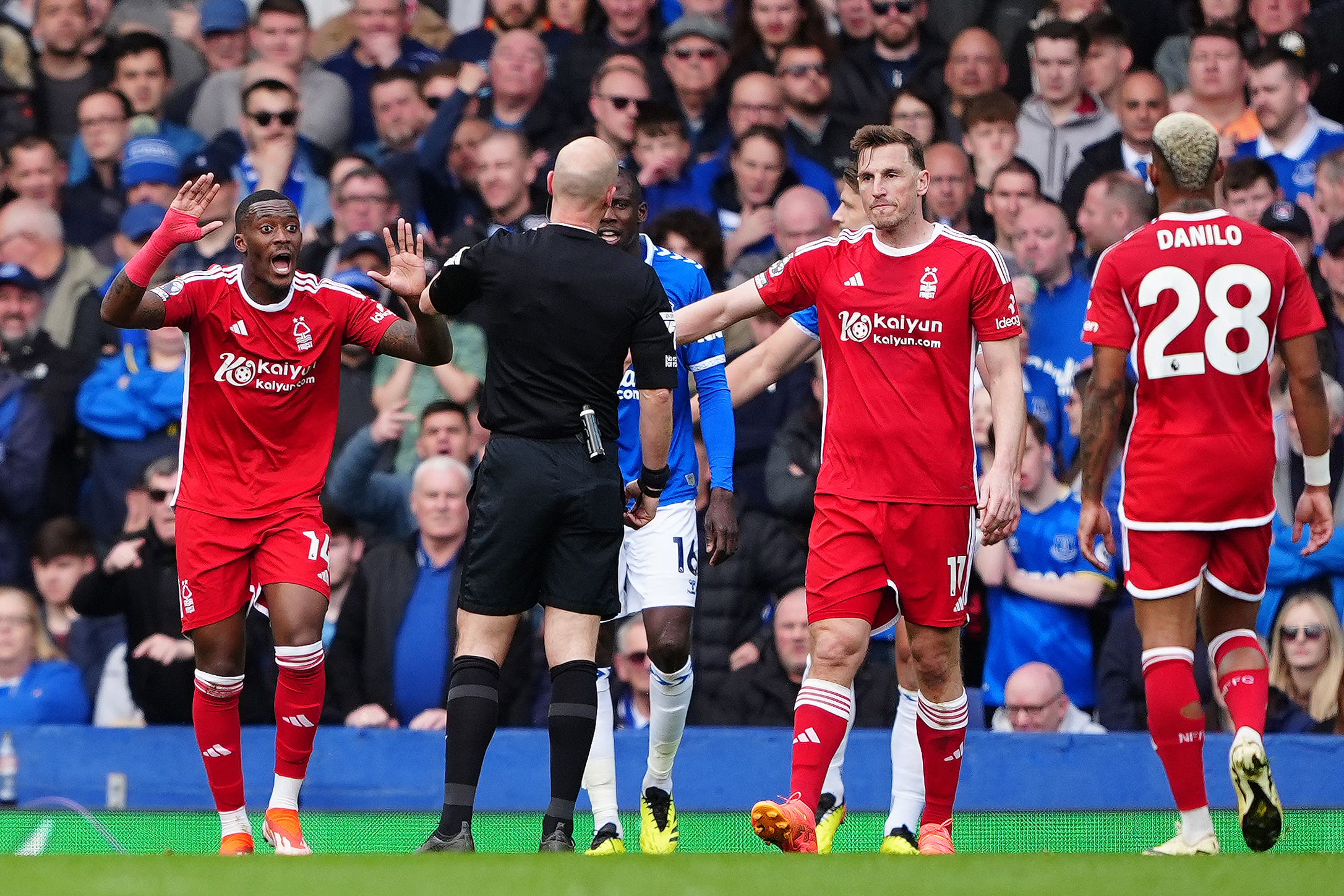Howard Webb admits Forest should have had at least one penalty against Everton
Forest felt they should have been awarded three spot-kicks against Everton on April 21.

Howard Webb has admitted Nottingham Forest should have been awarded at least one penalty in their recent highly-charged fixture against Premier League relegation rivals Everton.
Everton claimed a 2-0 win at Goodison Park on April 21 but Forest were incandescent that three separate penalty appeals were ignored by referee Anthony Taylor, with VAR Stuart Attwell not interfering.
Webb, the chief refereeing officer of Professional Game Match Officials Limited (PGMOL), believes Ashley Young’s challenge on Giovanni Reyna and his potential handball were both open to interpretation.
But speaking during the Match Officials: Mic’d Up programme on Sky Sports, Webb accepts Young’s tackle on Callum Hudson-Odoi should have led to Attwell directing Taylor to review the on-field decision.
“The referee waves away the penalty appeal,” Webb said. “We did hear Anthony Taylor in the footage say that he believed the ball had been played by Ashley Young, and we know that’s not the case.
“We know only Callum Hudson-Odoi touches the ball. The VAR looks at it and asks himself the question, ‘Was the non-award clearly and obviously wrong?’ and came to the conclusion it wasn’t.
“You hear him describing two players tussling for the ball. He doesn’t see a clear action by Young that he considers to be worthy of intervention, one that reaches the threshold of being very clear.
“We would have preferred an intervention for the referee to go to the screen to make a judgement in this situation and probably would have come out with a different outcome if that would’ve happened.”
Forest issued an extraordinary statement immediately after the match, saying they had warned PGMOL that Attwell was a Luton fan – another relegation rival – but that the referees’ body did not change his appointment.
Forest called for the audio to be released publicly, but later accepted an offer from PGMOL to hear it in private. Forest are understood to have heard the audio now but have not issued any comment.
“The game is played by human beings, it’s officiated by human beings,” Webb added. “Our job is to try to ensure that we have a positive impact on the game by identifying correct decisions on the field.
“This wasn’t one. When that doesn’t happen, the VAR consistently recognises when an error has happened on the field and steps in.
“But of course they’re humans making judgements as well so we always are trying to reduce the number of errors that we make.”
The Premier League is investigating Forest’s statement related to Attwell to determine whether it breached competition rules, while the Football Association asked for observations from Forest manager Nuno Espirito Santo, full-back Neco Williams and referee analyst Mark Clattenburg over comments they made about the officiating of the match.
On the first two penalty appeals being turned down, Webb said: “We felt (they) were really subjective calls.
“The first one involving some contact from Ashley Young on Gio Reyna. There was contact. The referee saw that but didn’t feel it was impactful enough to penalise.
“We’ve set quite a high threshold for penalising contact all over the field really, but also in the penalty area. It’s what the game has asked us to do.
“Not every single contact is a foul and this was one where there was quite minimal contact, consistent with other situations that we’ve waved away this season. The VAR quite rightly checked that one.
“The second one was a handball penalty situation. Ashley Young involved again. The ball hits his arm.
“He’s moving as he tries to close a shot down from short distance and the referee deemed that the arm was in a natural position and the VAR check completed that one as well – quite understandably, in this subjective zone of handball. We thought both of those situations were in line with our expectations.”
Webb also said that referees making in-stadium announcements after being sent to the pitchside monitor by the VAR – which was seen at last year’s Women’s World Cup – is something that is being looked at for the Premier League.
He added: “One of the things you’ll have seen maybe in FIFA tournaments, like the Women’s World Cup, is announcements from the referee once they’ve been to the screen.
“So we’re looking at that, we’re keeping an open mind about whether that’s something we could utilise in the Premier League.”
The League has agreed to introduce semi-automated offside technology (SAOT) from next season, with it anticipated that the technology will be ready to be introduced after one of the autumn international breaks.
Webb added: “At the moment we’re using software, dropping lines from players’ body positions, which takes time to do in a diligent way. Semi-automated offsides will speed that process up.”
Bookmark popover
Removed from bookmarks